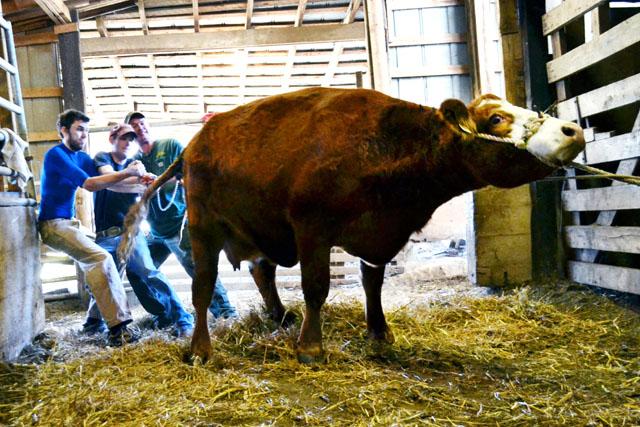When Ruffin Hutchinson isn’t studying animal science, he’s probably at home, waking up at dawn to take part in a family tradition. Since about 1875, Hutchinson’s family has owned and worked the land that he calls home. Though much has changed over the years with the farm, the family’s attitude toward farming hasn’t.
“I see it as carrying on a legacy,” said Hutchinson, a senior applying to veterinary school. “I have this opportunity to carry on what my family’s been doing for well over 100 years, and I have an opportunity to be part of something that’s more than just me, the individual.”
The Hutchinson family bought the 650-acre farm in Waco, a small town at the foothill of the mountains near Shelby, N.C., during the Reconstruction era when land was cheap. Today, the farm raises beef cattle, but in the past, the Hutchinson family cultivated row crops. Hutchinson said in the 1950s, his great-grandfather decided that beef was the way to go.
“Plants are at the mercy of nature, whether it’s a boll weevil infestation comes through or bad weather,” Hutchinson said. “Cows can be a bellwether. This last drought — we still had cows and profits, but on the other hand crops weren’t doing too well.”
At the farm’s peak, it raised more than 1,000 head of cattle to send to feed lots and stock farms, but now the family only has about 150. The new mission of the farm is to raise strong cows to sell to larger ranches.
“In the late ‘80s, we started doing something called a seed-stock operation, and now we raise cows and bulls for breeders to use in their herds,” Hutchinson said. “We’re trying to raise a cow that when introduced in a herd can put a calf on the ground that will grow and put on a lot of weight and make, so to speak, a lot of hamburgers.”
Cows that Hutchinson raises are send to Texas and the Midwest, where feed is plentiful, rather than bring food to cows across the nation.
The U.S. will consume more than 52 billion pounds of beef during 2012, according to the Earth Policy Institute.
“The amazing thing is we produce that much meat a year because consumption is so high,” Hutchinson said. “America has a taste for meat, and it keeps me in business.”
Though Hutchinson aspires to go to vet school, he said he will always be a farmer.
“When I look out on the farm, I see not just land, tree or grass, I see a part of my history.”








